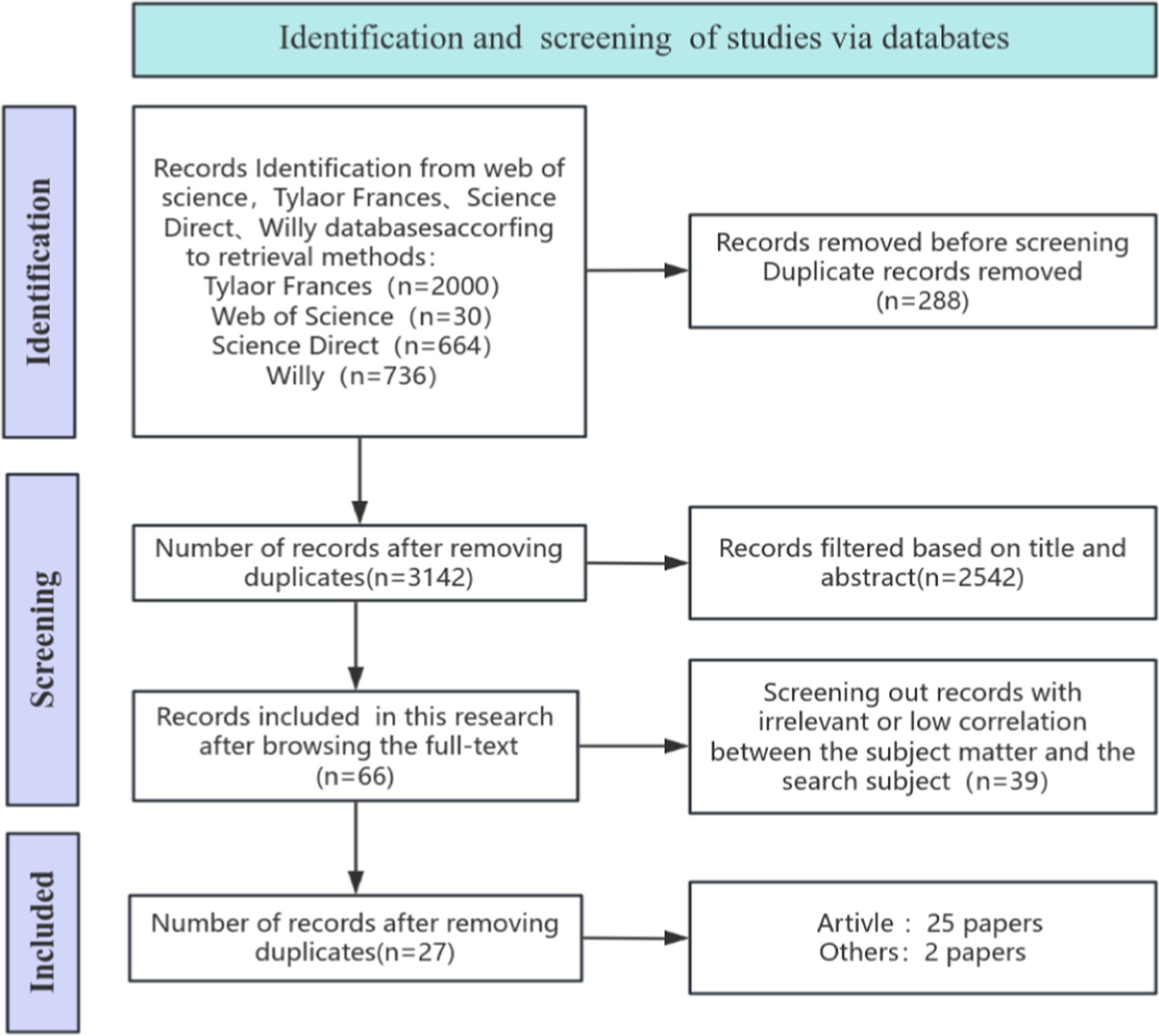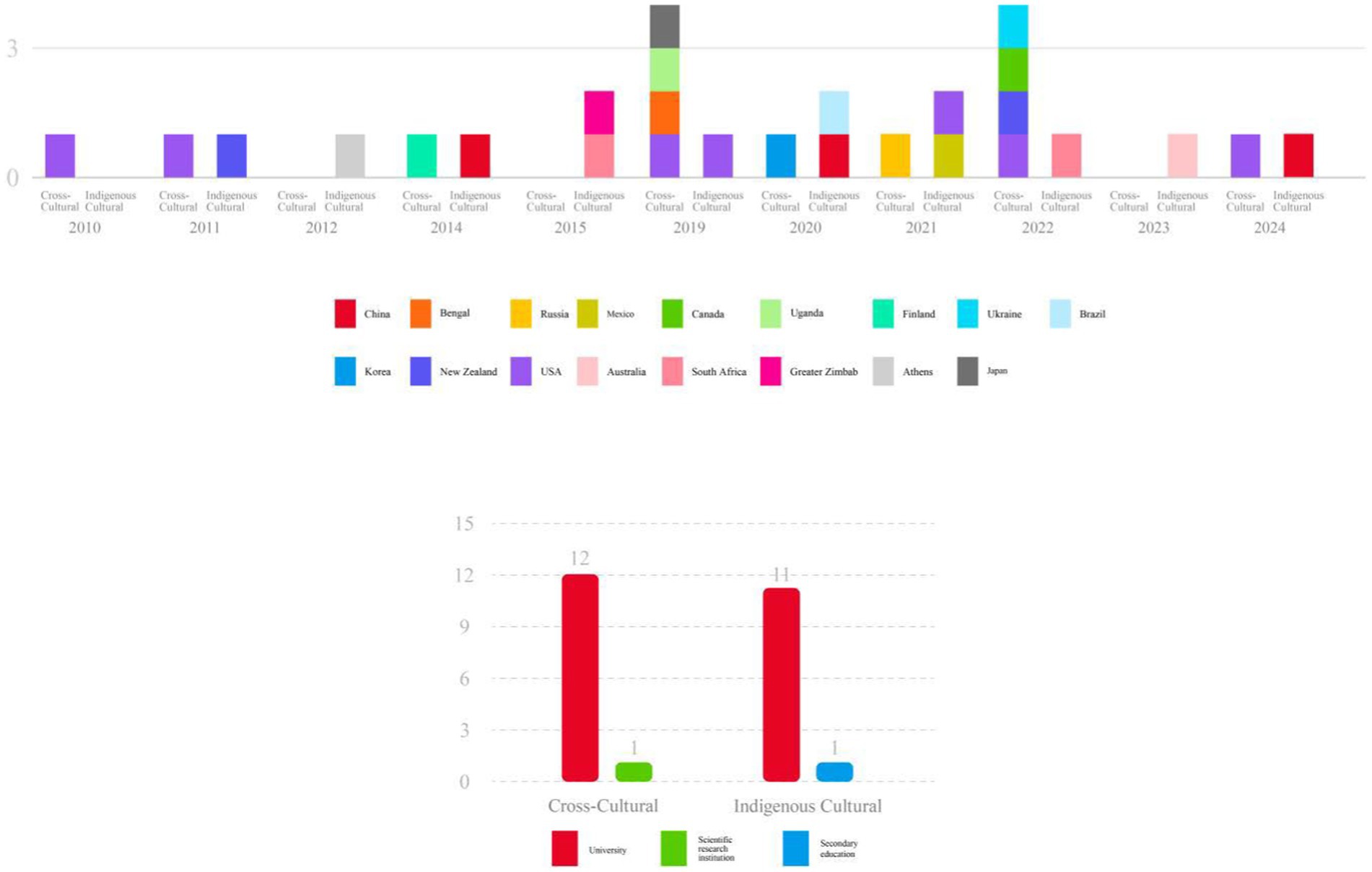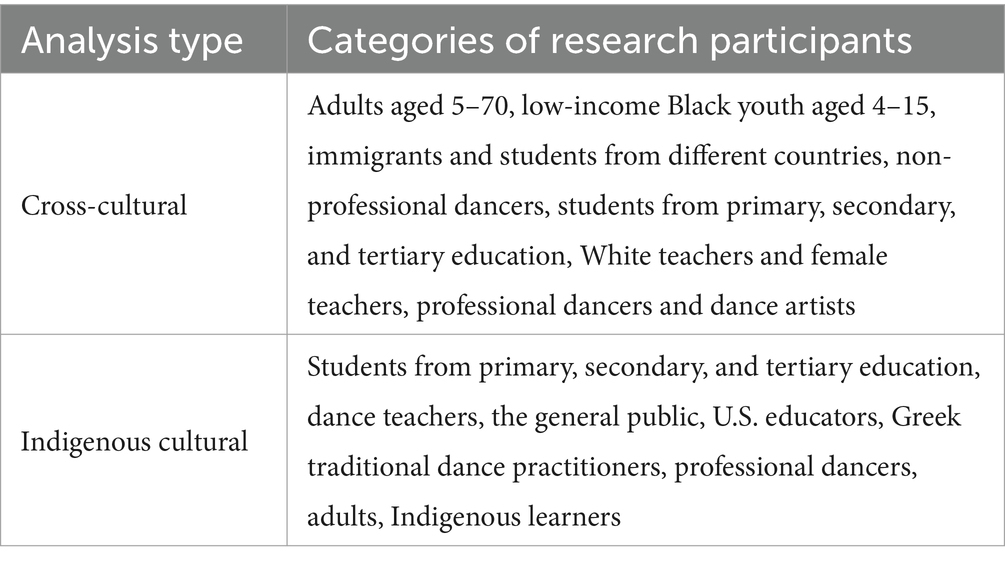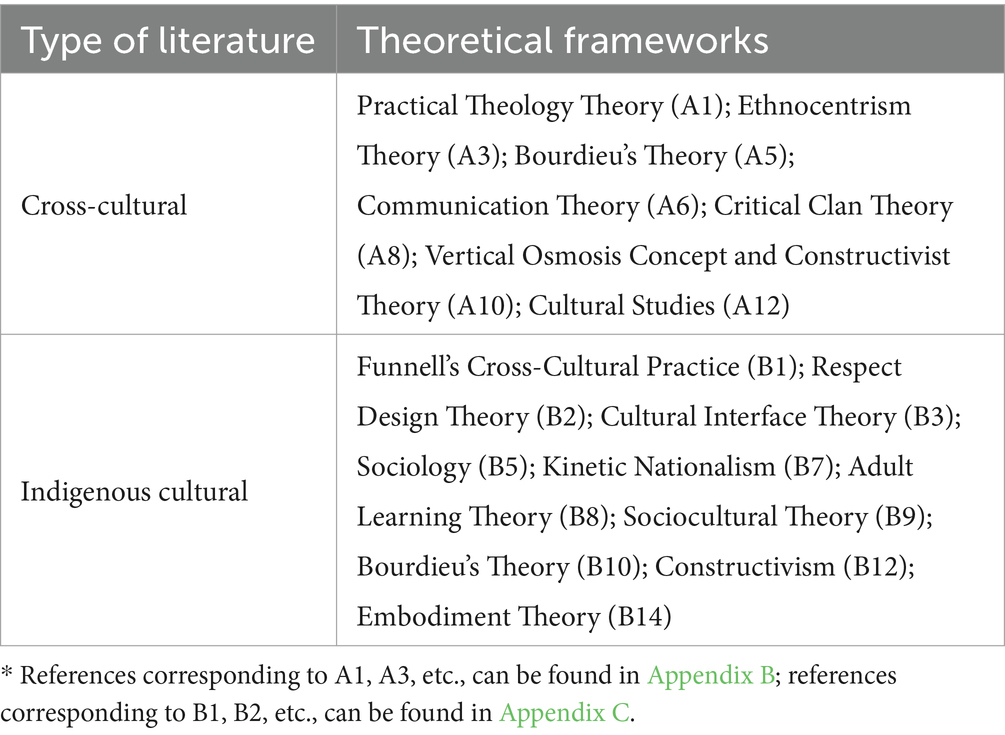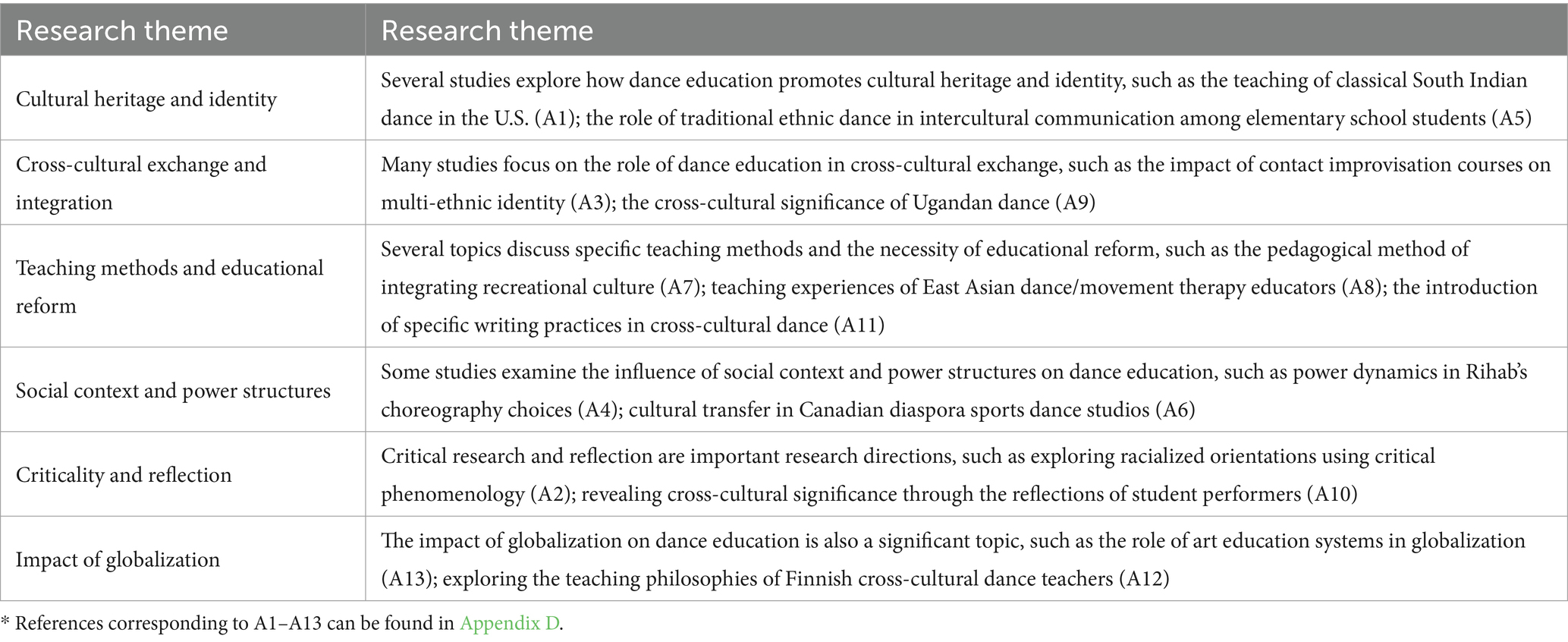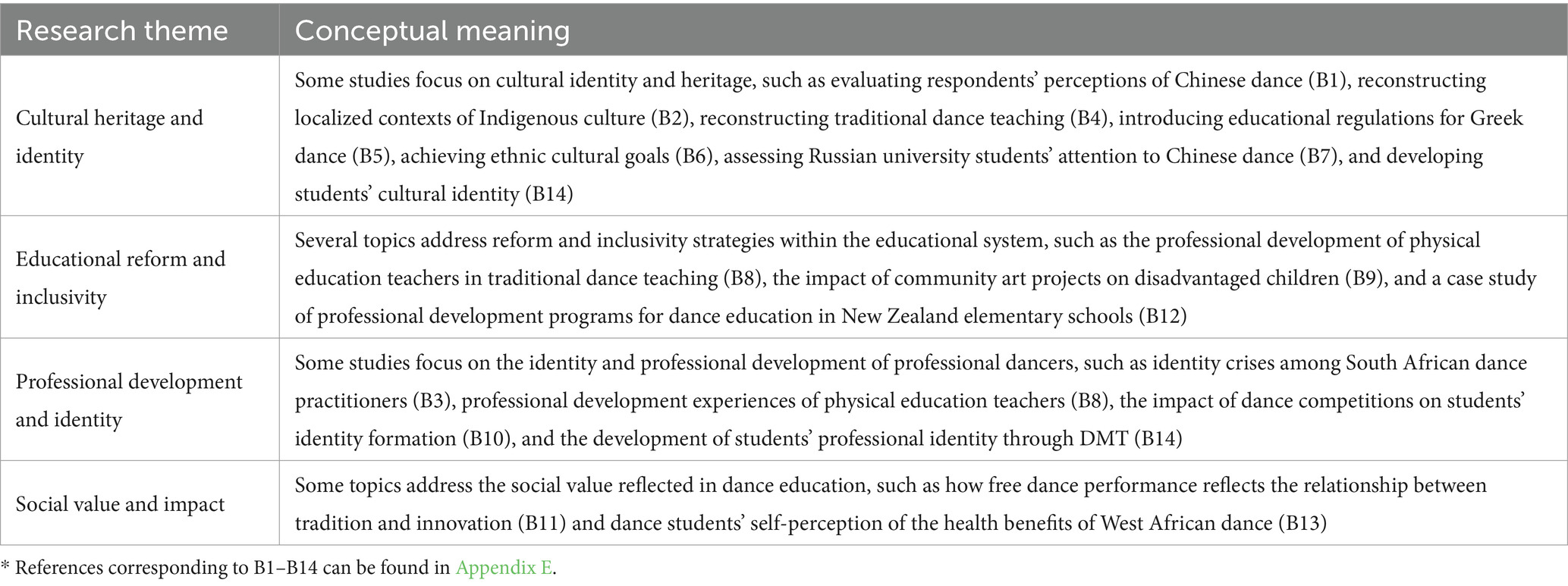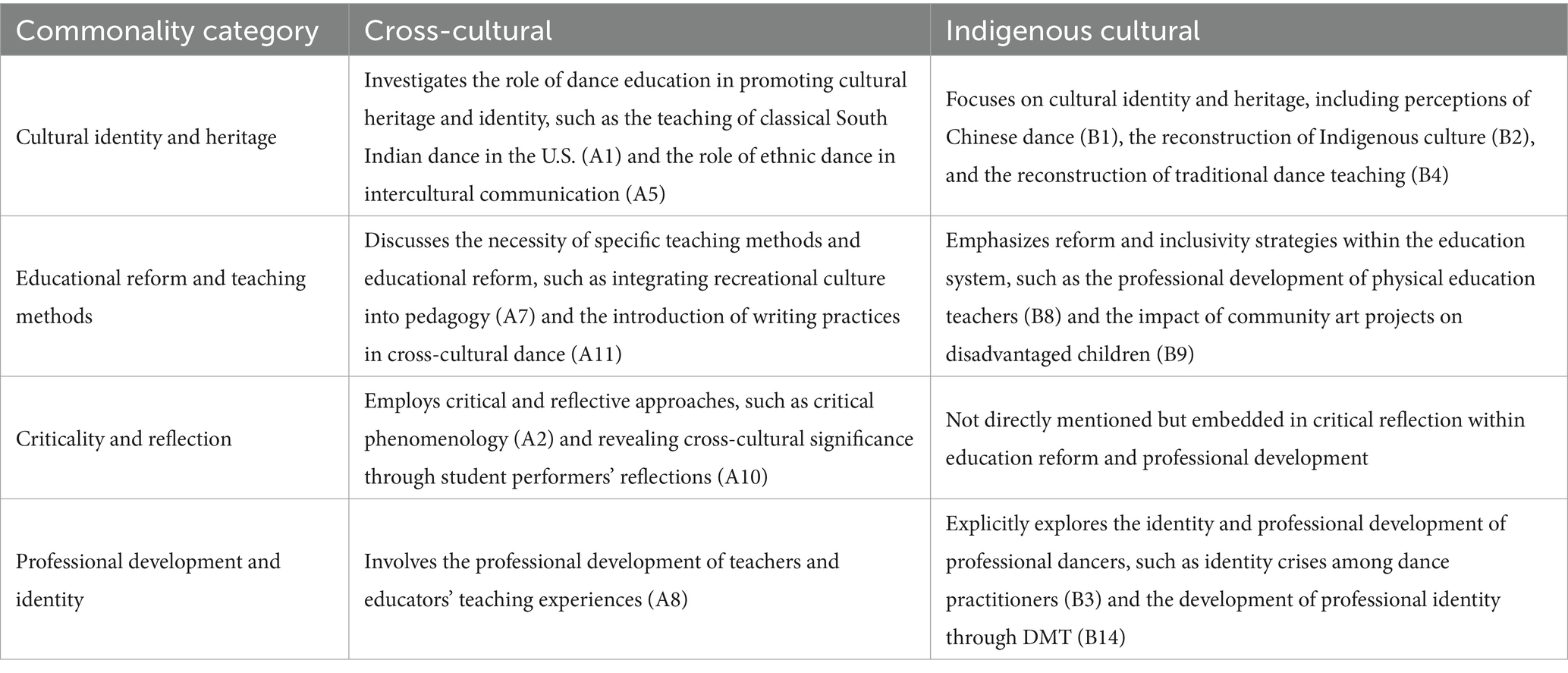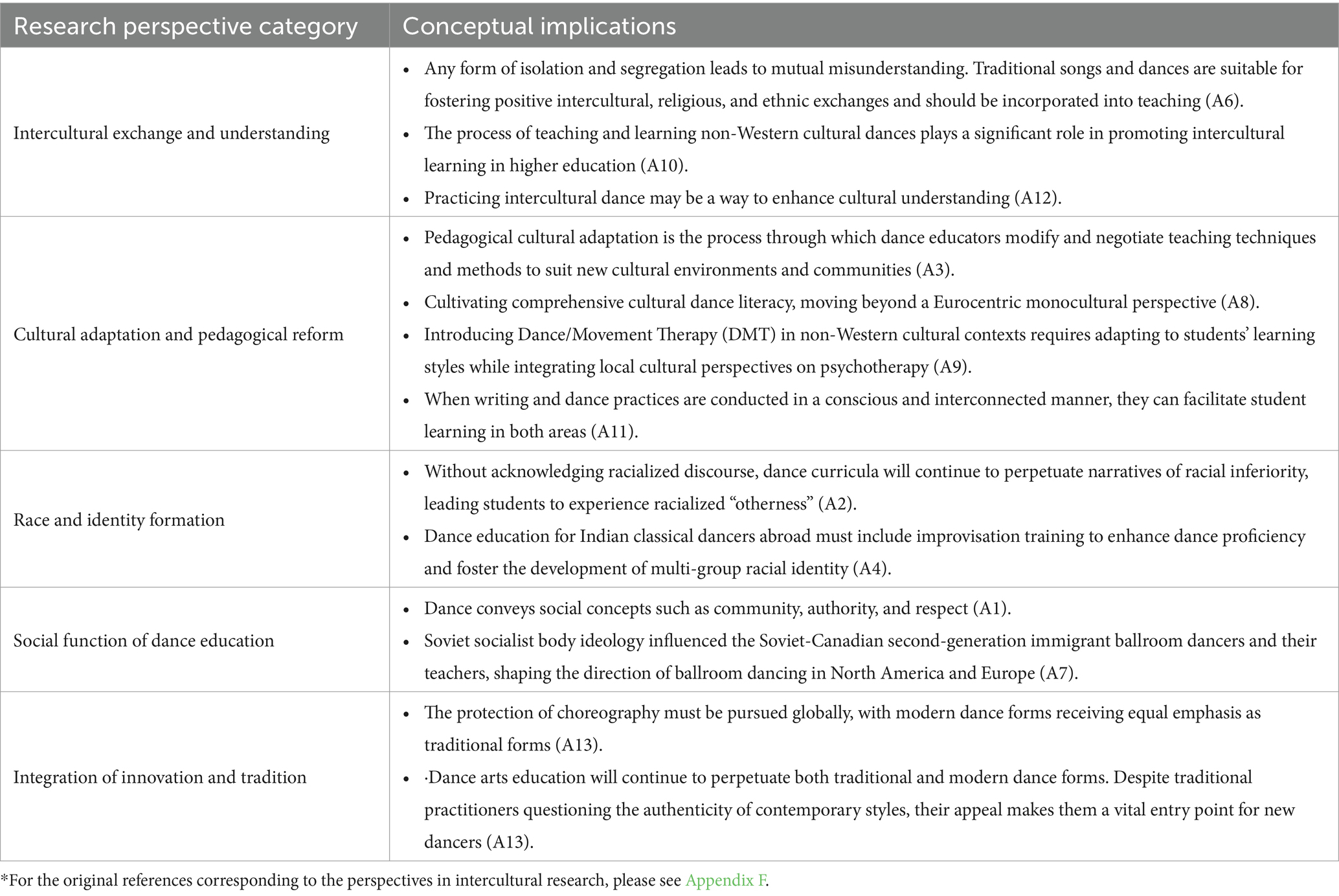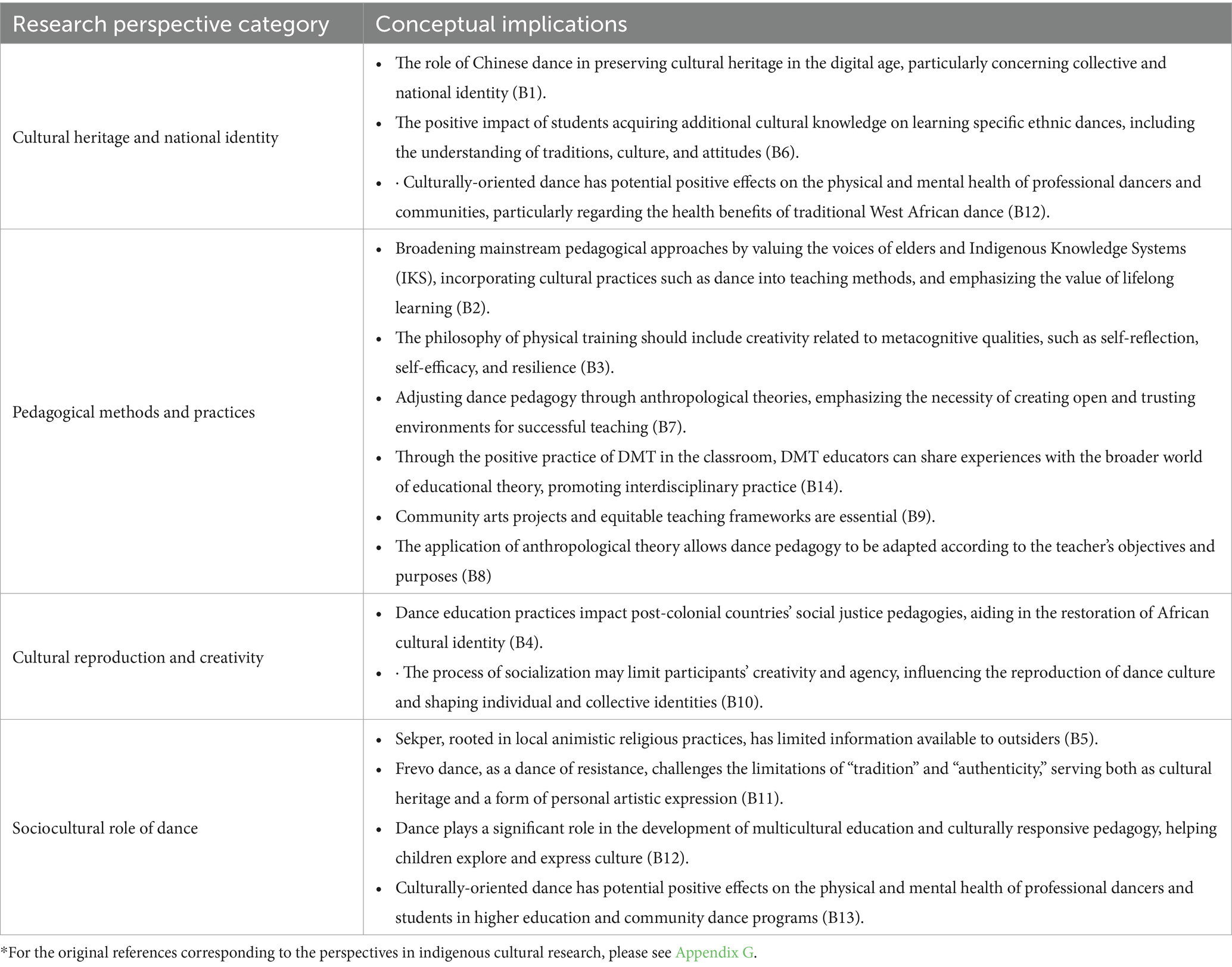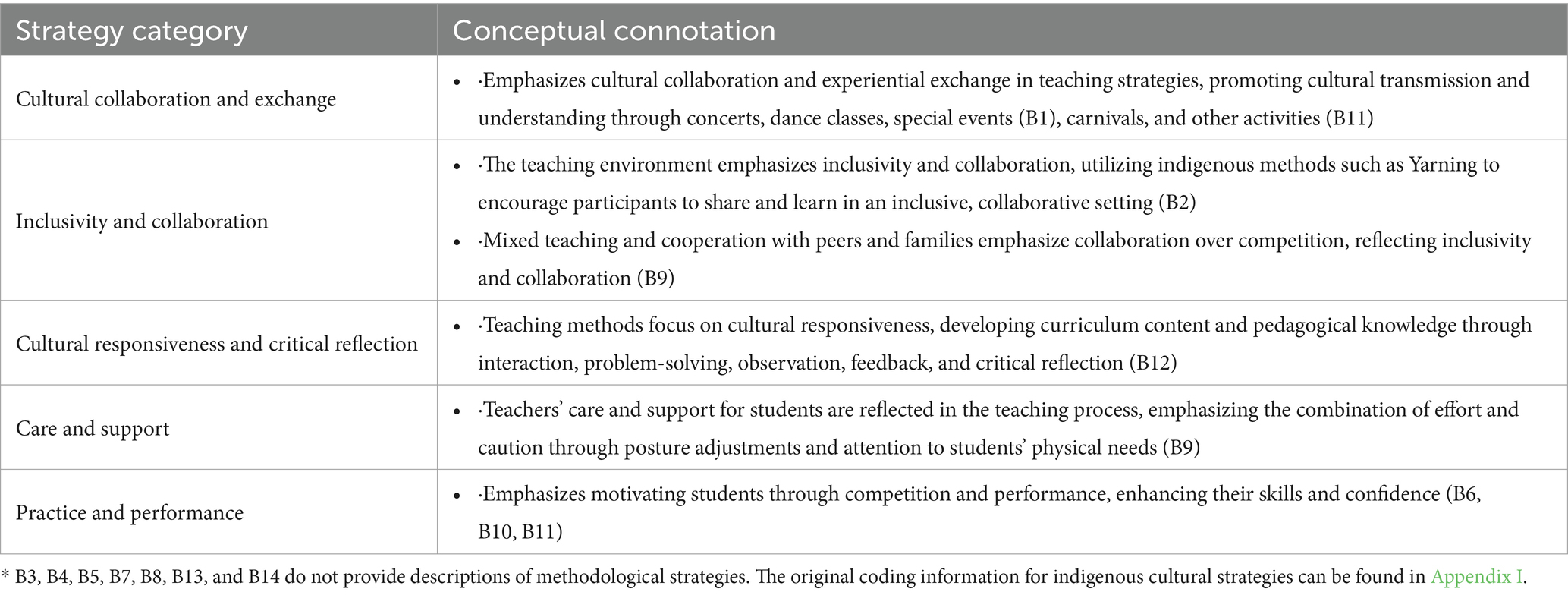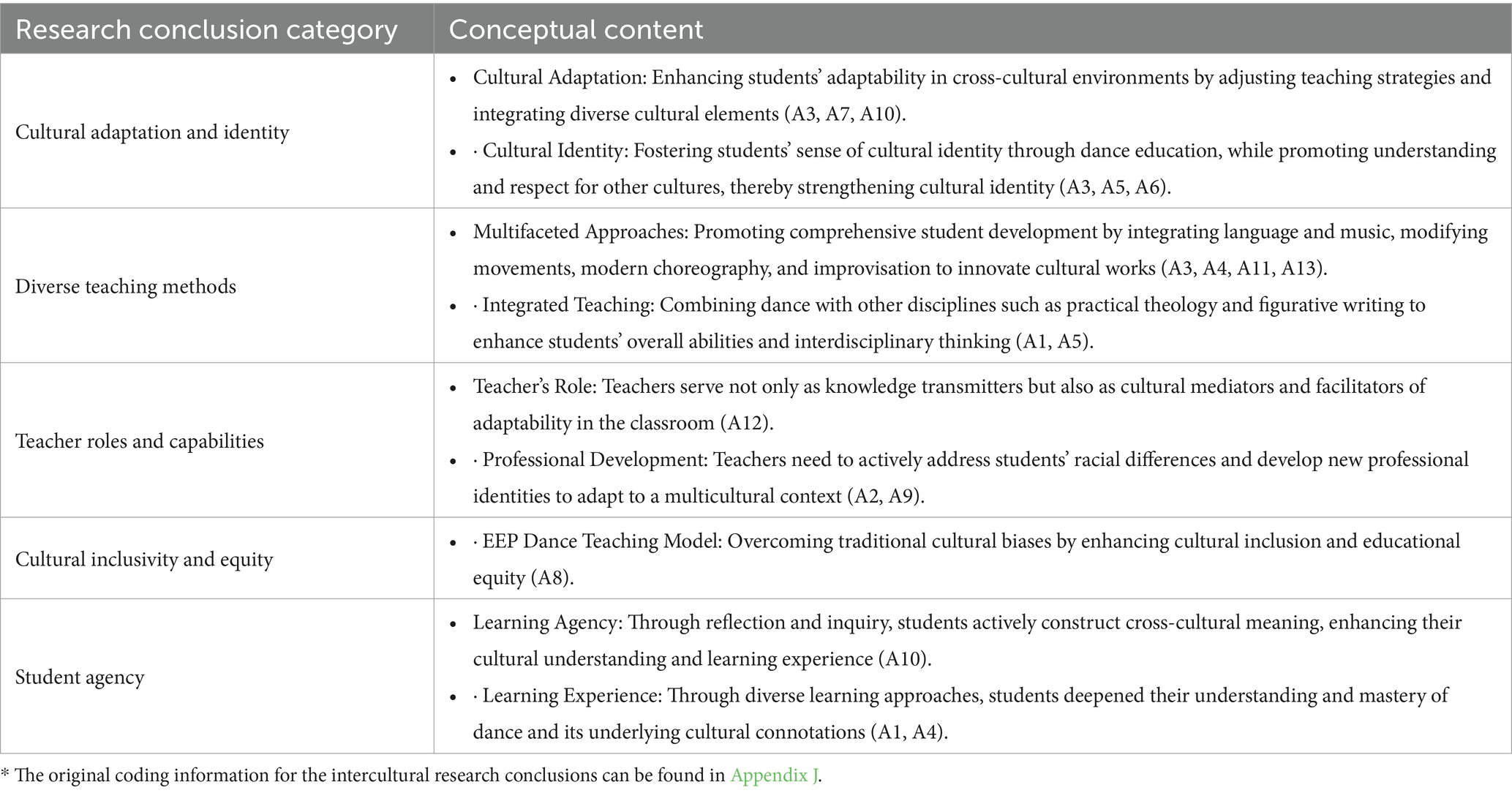- 1Department of Early Childhood Education, Hunan Women's University, Changsha, China
- 2School of Physics Science and Engineering, Tongji University, Shanghai, China
- 3Department of Dance, Xinghai Conservatory of Music, Guangzhou, China
Cultural dance fosters social cohesion, emotional well-being, creative thinking, and cultural identity by conveying cultural values and social meanings. However, systematic comparative research on cross-cultural and indigenous cultural dance education remains limited. This study, adopting a global perspective, examines the current applications, core issues, and educational strategies in this field. Through a systematic literature review and grounded theory approach, the research scrutinizes studies conducted from 2010 to 2024. The results show that intercultural research primarily focuses on multicultural exchange, cultural integration of immigrant groups, and cultural acceptance among socioeconomically disadvantaged populations, highlighting the influence of intercultural adaptability and globalization. In contrast, indigenous cultural research emphasizes local culture and educational systems, with a particular focus on local cultural identity and educational reform. While both types of research reach a consensus on the importance of cultural transmission, diversity in teaching strategies, and the critical role of educators, significant differences remain in cultural identity and the design of educational content. Future research could concentrate on virtual dance education, innovation in indigenous cultures, the exploration of dance education’s role in mental health, and the deep integration of artificial intelligence into dance pedagogy. Furthermore, consideration of the potential impact of globalization and technological advancement on cultural identity and educational models will foster theoretical innovation and practical development in dance education.
1 Introduction
Dance, as a universal human activity, holds profound cultural and social significance. It serves as a medium for conveying cultural values (Hanna, 1987) and communicates through cultural codes (Bannerman, 2014). Individuals from diverse cultural backgrounds possess unique perceptions of dance space and bodily awareness (Grau, 2012). Thus, dance, with its multisensory cross-cultural experience, becomes a crucial medium for expressing cultural differences and social power dynamics (Desmond, 1993).
“Cultural dance,” defined as the dance of a specific cultural or ethnic group, often rooted in celebratory purposes—whether religious, secular, or social (Olvera, 2008)—has been increasingly utilized in dance education in recent years. In recent years, with the rapid advancement of globalization, cultural dance has gradually been incorporated into global education systems. Through multicultural exchange and interaction, it offers new possibilities for cross-cultural dialogue and understanding (Shapiro, 2008). It is not merely a form of physical expression but also a tool for enhancing clinical communication with patients (Darivemula et al., 2021). Moreover, it serves as a medium for conveying the values, beliefs, traditions, and histories of diverse groups, fostering social cohesion, emotional well-being, creative thinking, and cross-cultural understanding (Hanna, 1987).
However, the cultural homogenization brought about by globalization poses significant challenges to cultural dance education. Achieving an effective balance between multicultural integration and the tension of global cultural homogenization, while maximizing the potential of cultural dance education in promoting cross-cultural understanding and global cultural dialogue, has become a pressing issue.Despite numerous studies on cultural dance education in specific regions (Rowe, 2008; Gartzonika, 2013; Lewis and Ziady, 2021; Liu and Kalimyllin, 2024), systematic reviews, particularly comparative studies of cross-cultural and indigenous cultural dance education, remain scarce. This research gap limits our comprehensive understanding of dance education across different cultural contexts.
To address this gap, this study employs a systematic literature review to explore the similarities, differences, and developmental trends of intercultural and indigenous cultural dance education from a global perspective. By placing intercultural and indigenous cultural dance education within the same theoretical framework for systematic comparison, the research analyzes their educational strategies, core issues, and research perspectives across different cultural contexts. This analysis aims to reveal the impact of dance education on cultural identity, social values, and educational practices in varying cultural settings, providing theoretical support for future theoretical construction and educational practices in intercultural and indigenous cultural dance education. The specific research questions are as follows:
RQ1: What dynamic differences exist in the publication timeline, countries, institutions, and distribution of research subjects in intercultural and indigenous cultural dance education studies?
RQ2: What differences are observed in the core issues and application of theoretical frameworks in intercultural and indigenous cultural dance education research?
RQ3: What research perspectives exist on cross-cultural and indigenous cultural dance education? What similarities and differences are observed?
RQ4: What methods and strategies have been employed in cross-cultural and indigenous cultural dance education? How do they compare?
RQ5: What conclusions have been drawn from research on cross-cultural and indigenous cultural dance education? What are the similarities and differences?
2 Literature review
As early as 1963, researchers began to recognize the value of ethnic dance within cultural contexts (Kurath et al., 1963). Some scholars argue that all forms of dance should be viewed as ethnic dance within their specific cultural frameworks (Kealiinohomoku, 1970). The study of dance history and culture should be interwoven to fully comprehend the role of dance in various societies (Dils and Albright, 2001). Dance education should begin in early childhood to develop children’s awareness of movement and culture (Stinson, 1988), and it should also address power relations and social differences to foster critical thinking and social justice (Shapiro, 1998). With the growing academic focus on cultural dance education, research on both cross-cultural and indigenous cultural dance education has gained significant attention in the context of globalization (Bhabha, 2012).
2.1 Current research on cross-cultural dance education
Cross-cultural dance education encompasses a variety of approaches and perspectives. For example, multicultural dance education in the United States has suggested potential applications for Indonesian dance education (Masunah, 2008). Finnish teachers have adapted their teaching methods through cultural dances such as African dance, Oriental dance, and Flamenco (Siljamäki et al., 2010). In South Korea, a Laban expert expanded creative movement into public dance education, promoting “cultural democracy” (Hwang, 2013). Bharatanatyam, an Indian classical dance, has served as a tool for Asian Indian arts and cross-cultural literacy, influencing the cognition of Asian Indian children living in the West—particularly in terms of cultural identity and understanding (Iyengar, 2014). Dance companies in Australia and other regions have maintained emotional connections to tradition through organizational structures and adapted teaching principles (Mollenhauer, 2022). Studies have also addressed decolonization issues through cross-cultural dance education (Mejia, 2023) and enhanced cross-cultural reflective abilities (Mabingo et al., 2024). Existing research highlights the importance of cultural awareness, cultural democracy, ethical practices, and pedagogical adaptation in cross-cultural dance education, demonstrating its social value.
Meanwhile, research indicates adaptive challenges in cross-cultural anxiety screening (Wang et al., 2024; Gabunia et al., 2023), suggesting that cross-cultural dance education may face similar cultural adaptation issues in its promotion and application. This underscores the need for further investigation into its stability and practicality within diverse cultural contexts.
2.2 Current research on indigenous cultural dance education
Indigenous cultural dance education plays a crucial role in promoting cultural competence and inclusivity across various environments. For instance, Nannyonga-Tamusuza (2003) explored how the performance of the ba’a’kisimba dance redefined gender meanings. Banks (2007) investigated how Africans used dance to challenge colonial legacies, while Finkelstein (2022) showed that dance education can serve as a means of resistance and identity reconstruction. Phillips-Fein (2011) guided students to analyze dance within historical, social, and cultural contexts to develop critical thinking. Mabingo (2015) focuses on the analysis of policy documents, curricula, and practices within American dance education. Iacono and Brown (2016) explore dance as a living cultural heritage. Schupp (2019) reveals shifts in dance competition culture since the 1980s. Rosala and Budiman (2020) identify how traditional dance has been used to enhance students’ character in Indonesia. Liu and Kalimyllin (2024) investigate pathways for the transmission of Chinese culture through intangible cultural heritage dance. Existing research indicates that indigenous cultural dance education not only serves as a significant means of cultural expression but also fosters cultural diversity and social inclusivity.
Despite the growing body of research on intercultural and indigenous cultural dance education worldwide, and the rich theoretical contributions made by scholars in areas such as cultural heritage, multicultural education, and educational reform (Smith and Smith, 2013), several limitations still exist in the current studies. First, research on intercultural dance education tends to focus on cultural exchange and inclusivity within the context of globalization, but discussions on how to implement effective educational practices in different socioeconomic contexts are relatively insufficient. Second, while studies on indigenous cultural dance education emphasize the integration of cultural heritage and local educational systems, there is a lack of systematic exploration that combines modern teaching methods with the influences of globalization. Therefore, there remains considerable room for further exploration and deepening of the theoretical framework integration and practical application strategies in intercultural and indigenous cultural dance education research. These research limitations provide important entry points for subsequent investigations into the differences and commonalities between the two in terms of cultural understanding, social structural influences, and teaching strategies, while revealing the challenges and opportunities faced by the diversity of dance education and cultural heritage in the context of globalization.
3 Methodology and materials
3.1 Introduction to SLR methodology
This study employs the Systematic Literature Review (SLR) methodology (Xiao and Watson, 2019; Yang et al., 2022; Jensen and Bonde, 2018; Peng et al., 2024; Lin and Yu, 2024) to systematically and rigorously review and compare scholarly research on cultural dance education worldwide. The SLR approach ensures comprehensive literature coverage and reliability of research outcomes through its stringent procedures and transparent reporting requirements (Kushairi and Ahmi, 2021).
In practice, this study utilizes the standardized PRISMA screening process to select relevant literature (Page et al., 2021; Jin et al., 2024; Yu et al., 2024; Chen et al., 2024). An encoding system was established to collect objective data from the included literature (e.g., publication date, journal, research methods, and theoretical frameworks) and to extract textual coding information (e.g., core issues, authors’ perspectives, and research conclusions). The objective data were then subjected to quantitative statistical analysis and visual representation, while the textual coding information was analyzed using a combination of qualitative textual description and visualized charts.
3.2 Initial literature search
In alignment with the PRISMA guidelines (Page et al., 2021), we conducted a comprehensive literature search to gather the data required for this study. Four international English-language databases with the highest publication volume in this field were selected: Taylor & Francis, Web of Science, ScienceDirect, and Wiley. The inherent inclusion standards of these databases ensured that the selected literature generally met the quality requirements of the SLR. The search criteria were defined based on the study’s topics and objectives, and relevant keywords were determined by referencing related studies (Bhugra, 2005; Sanz-Camarero et al., 2023). For example, in the Web of Science database, the search string was: *TS = (“dance” AND “educati” AND “cultural identity” OR “Cultural Identity Construction” OR “Social Impact”)**. The search was conducted on April 28, 2024. The initial search across the five databases yielded a total of 3,142 documents after removing duplicates (the number of documents retrieved from each database is shown in Figure 1). Although five mainstream international English literature databases were selected to ensure the comprehensiveness of the literature data and the quality of the research, the random selection of databases may result in the exclusion of certain relevant studies, thereby introducing a risk of selection bias. Furthermore, considering that this study primarily relies on English databases for literature retrieval, there may be a lack of non-English literature, which could lead to an incomplete reflection of research findings on intercultural and indigenous cultural dance education within non-English contexts. These factors may pose challenges to the generalizability and comprehensiveness of the research conclusions, highlighting the need for future studies to further focus on the inclusion and analysis of multilingual literature.
3.3 Manual screening
During the screening process, we applied a set of clear criteria to select relevant literature. Inclusion criteria were as follows: (1) the literature must be peer-reviewed; (2) the research content must involve dance education within cross-cultural or indigenous cultural contexts; (3) the literature must explore topics related to cultural identity, educational reform, professional development, or social value; (4) the publication date must be after 2010; (5) the full text must be accessible online. Exclusion criteria included: (1) conference abstracts, review articles, books, and book reviews; (2) studies unrelated to dance education; (3) literature whose themes were not aligned with the research questions.
The manual screening was conducted in two stages. In the first stage, irrelevant literature was excluded based on titles and abstracts. This process took approximately 4 weeks, and two members of the research team were involved. After deduplication, 66 articles were retained from the five databases. In the second stage, a thorough reading of the full texts was conducted to pinpoint the literature required for this study. Three team members participated in this stage, which also took about 4 weeks, ultimately resulting in the retention of 27 articles. The complete literature screening process is illustrated in Figure 1. The citation information of the included literature is provided in Appendix A.
3.4 Analysis and coding
For the included literature, we systematically recorded critical information such as metadata, core issues, methodological strategies, authors’ perspectives, and research conclusions using standardized data extraction forms. Subsequently, a content analysis was conducted, in which the extracted data were coded and thematically categorized to identify and summarize the main characteristics and differences between cross-cultural and indigenous cultural dance education in areas such as cultural identity, identity construction, educational reform, teacher development, and social value representation. To ensure the objectivity and reliability of the analysis (Gaur and Kumar, 2018), a double-coding strategy was employed, where two researchers independently coded the data and resolved any discrepancies through discussion and consensus. Table 1 presents the coding framework used in this study.
4 Performance analysis (RQ1)
4.1 Overview of performance indicators
4.1.1 Publication time, venues, and volume
To provide a clearer representation of the research trends, Figure 2 summarizes the specific data on publication timelines and journal distribution.
An analysis of the publication time and volume indicates a general upward trend in the number of studies on cross-cultural and indigenous cultural dance education from 2010 to 2024. Particularly after 2019, the volume of research in both areas has increased, reflecting the growing academic interest in cultural diversity and educational models in the context of globalization. Although research on indigenous cultural dance education slightly outnumbers cross-cultural studies overall, cross-cultural research has shown a steady increase in recent years, peaking in 2022 with four publications, far exceeding other years.
On the other hand, an analysis of publication venues reveals that research on both cross-cultural and indigenous cultural dance education has been featured across various academic platforms. Key journals such as the Journal of Dance Education and Research in Dance Education have served as important outlets for this type of research, providing a stable academic platform and reflecting the concentration and specialization of the field. Additionally, the National Dance Education Organization and the Dance Studies Program have offered significant supplementary perspectives, particularly in 2022, where cross-cultural studies were prominently featured. Indigenous cultural research, meanwhile, is distributed across a broader range of publications, including interdisciplinary journals such as Critical Studies in Education and Africa Education Review, highlighting the diversity and cross-disciplinary nature of the field.
Overall, the distribution of publication volume reflects the growing interest among scholars in cross-cultural exchange and educational models, while the distribution across publication venues indicates a broad academic exploration of cultural diversity and educational approaches, covering topics from professional dance education to sociocultural studies.
4.1.2 National productivity and distribution of research institutions
To more clearly illustrate the distribution of national productivity and research institutions, Figure 3 provides a visual comparison.
An analysis of national productivity and research institutions shows that cross-cultural dance education research involves nine countries, demonstrating broad international engagement and the characteristic of cross-cultural exchange. Indigenous cultural dance education research involves 10 countries, indicating the depth and extensive coverage of indigenous cultural studies in specific regions. Additionally, cross-cultural dance education research spans 12 universities and one research institution, highlighting the professionalism and concentration of academic research. In contrast, indigenous cultural studies also involve 12 universities, with the addition of one secondary education institution and two studies without specified institutions, suggesting that indigenous cultural research is conducted not only in universities but also across different levels of educational institutions.
In summary, cross-cultural dance education research reflects global academic collaboration and the exploration of diverse cultural backgrounds, showcasing international cooperation. In contrast, indigenous cultural research demonstrates strong academic support and in-depth local research within specific countries and regions. The distribution of core productivity in both fields reflects the differences in research focus and institutional support.
4.1.3 Characteristics of research participants
To detail the differences in research participants between cross-cultural and indigenous cultural dance education, Table 2 provides a comparative summary of the various research participants.
The research team conducted a comparative analysis of the research participants involved in cross-cultural and indigenous cultural dance education studies, The results are as shown in Table 3.
These findings reveal that cross-cultural dance education research features greater diversity and breadth in its participants, with a strong emphasis on multicultural backgrounds and issues of social equity. In contrast, indigenous cultural dance education research is more focused on groups within specific cultural and educational systems, highlighting the importance of cultural heritage and educational practices. This comparison provides direction for future research, allowing researchers to select appropriate subjects based on specific needs to achieve more comprehensive and in-depth study results.
4.1.4 Theoretical frameworks
Table 4 summarizes the theoretical frameworks used in cross-cultural and indigenous cultural dance education research, highlighting the theoretical support within different research contexts.
The research team conducted a further analysis of the theoretical frameworks applied in cross-cultural and indigenous cultural dance education studies, as presented in Tables 5, 6.
The analysis reveals that, in terms of cultural understanding, both cross-cultural and indigenous frameworks value cultural understanding and respect, emphasizing cultural diversity and inclusivity in dance education. Regarding social structure and power dynamics, both explore the role of these elements in dance education, uncovering the impact of power relations on the educational process. In teaching strategies and the role of teachers, both highlight the importance of teachers in dance education, particularly in curriculum design and implementation.
The differentiation analysis shows that, in the realm of cultural exchange and interaction, cross-cultural dance education focuses more on exchange and interaction between cultures, while indigenous cultural dance education concentrates on interactions at cultural intersections. In terms of religious belief, cross-cultural dance education gives greater attention to the influence of religion and belief systems on dance, a topic less explored in indigenous cultural dance education. Concerning cultural identity, cross-cultural dance education emphasizes identity in the context of new nationalism, whereas indigenous cultural dance education focuses on the relationship between dance movements and ethnic identity. In the sociocultural environment, cross-cultural dance education emphasizes the role of teachers within cross-cultural contexts, while indigenous cultural dance education addresses the impact of dynamic sociocultural environments on the educational process.
4.2 Thematic analysis (RQ2)
4.2.1 Open coding
To gain a deeper understanding of the core issues in dance education within cross-cultural and indigenous cultural contexts, we conducted a systematic analysis of the selected literature. Tables 7 and 8 summarize the primary research themes and contributions of both in areas such as cultural identity, educational reform, professional development, and social value.
Overall, the core issues in cross-cultural dance education encompass various countries and cultural backgrounds, reflecting the diversity and breadth of cross-cultural dance education. Additionally, these issues involve multiple disciplines, including culture, education, sociology, and theology, highlighting the interdisciplinary nature of the research. Many studies not only explore theoretical questions but also focus on teaching methods and practice, such as discussions of specific teaching methods and suggestions for curriculum reform.
On the other hand, the broad scope and profound impact of research on indigenous cultural dance education emphasize the multiple roles of dance in culture, education, profession, and society.
4.2.2 Axial coding
Building on this, we further analyzed the commonalities and differences of these themes through axial coding, as shown in Tables 9, 10, aiming to reveal how cross-cultural and indigenous cultural dance education advances these core issues in similar and different contexts.
Both types of research emphasize cultural identity and heritage, educational reform and the development of teaching methods, criticality and reflection, as well as the exploration of professional development and identity.
In summary, both cross-cultural and indigenous cultural dance education share similarities in their core issues, such as an emphasis on cultural heritage, educational reform, and social impact. However, significant differences also exist. Cross-cultural research highlights cultural exchange and critical analysis within a globalized context, emphasizing cross-cultural exchange and diverse teaching methods. On the other hand, indigenous cultural research focuses on the cultural identity, educational practices, and professional development of specific countries, with an emphasis on local cultural heritage and the improvement of teaching experiences. These comparisons not only reveal the multidimensional impact of dance education in different cultural and social contexts but also provide rich perspectives and directions for future research.
4.3 Analysis of research perspectives (RQ3)
4.3.1 Open coding
In our in-depth analysis of research on intercultural and indigenous cultural dance education, we utilized open coding to summarize the core perspectives of each body of work. Tables 11, 12 reveal unique insights into key themes such as cultural exchange, pedagogical methods, identity formation, social function, and the integration of innovation and tradition.
In summary, the analysis of the core perspectives in intercultural dance education highlights the multifaceted role of dance in intercultural exchange, cultural adaptation, racial identity, social functions, and the integration of innovation and tradition. These studies collectively emphasize dance as not merely an art form but a crucial tool for cultural transmission, social norm education, and identity construction. Through dance education, understanding and integration between different cultures can be enhanced, thereby promoting equity and inclusivity in education while also preserving and disseminating dance heritage globally.
In conclusion, research on indigenous cultural dance education underscores the multifaceted roles of dance in cultural heritage preservation, national identity, pedagogical innovation, cultural reproduction, and the sociocultural role of dance. The studies demonstrate that dance not only plays a vital role in personal health, cultural understanding, and pedagogical practices but also has profound implications for social justice and cultural restoration.
4.3.2 Axial coding
When analyzing the authors’ perspectives on cross-cultural and indigenous cultural dance education, we can identify certain commonalities and differences. Tables 13, 14 provide a comparative analysis of these commonalities and differences, helping to reveal similarities and distinctions between the two in areas such as cultural exchange and identity, teaching methods, identity formation, social functions, and the integration of innovation with tradition.
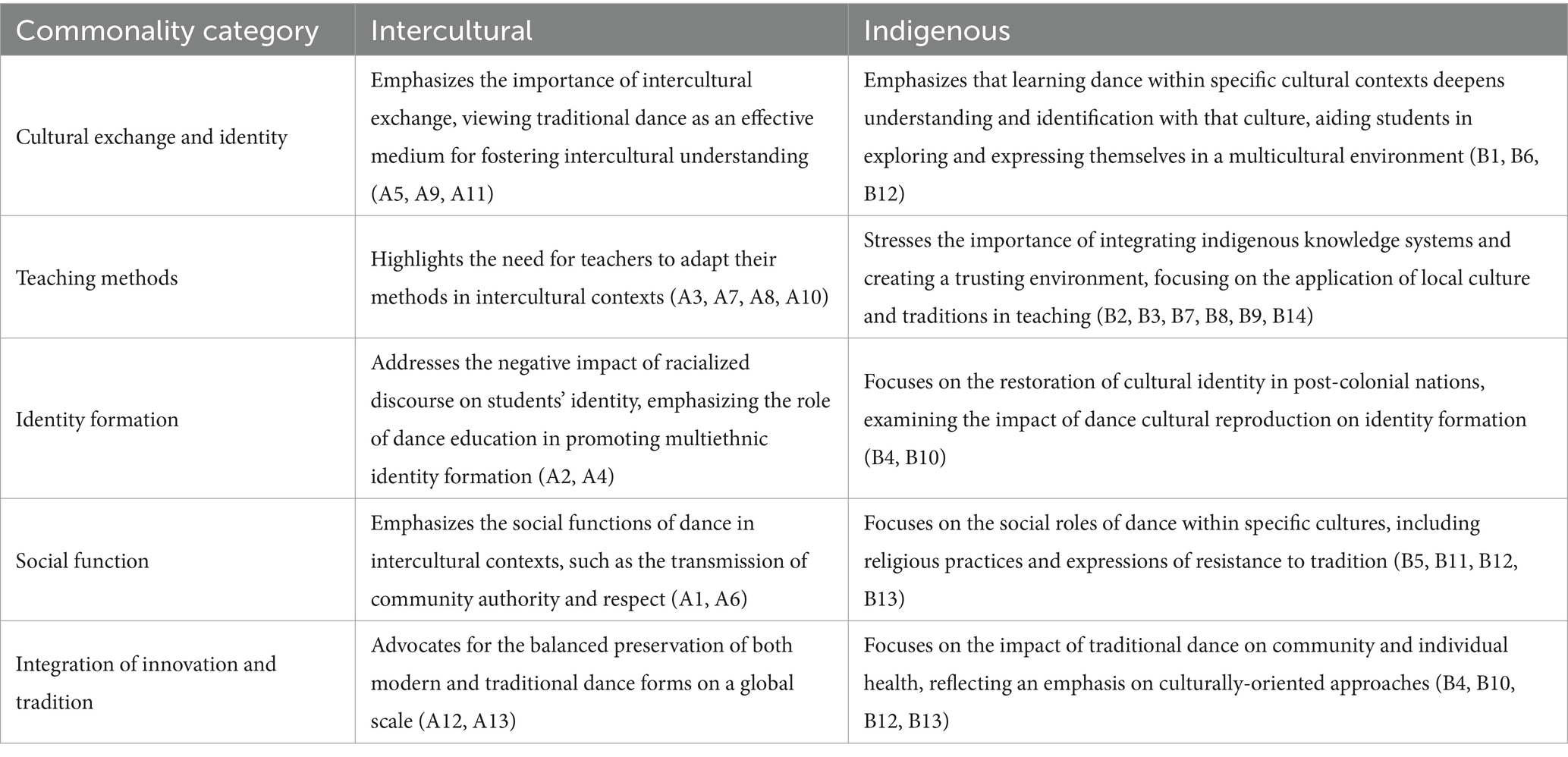
Table 13. Comparative analysis of commonalities between intercultural and indigenous cultural perspectives.

Table 14. Comparative analysis of differences between intercultural and indigenous cultural perspectives.
Intercultural and indigenous cultural dance education share common ground in cultural exchange, teaching methods, identity formation, social function, and the fusion of innovation with tradition. However, they also exhibit significant differences. Intercultural research emphasizes adaptation and diversified teaching methods within a global context, while indigenous cultural research centers on the preservation of local traditions and the improvement of specific teaching practices. These comparisons not only illuminate the multidimensional impact of dance education across different cultural and social contexts but also offer valuable perspectives and directions for future research.
In summary, the analysis of differences between intercultural and indigenous cultural dance education in areas such as cultural exchange, teaching methods, identity formation, social function, and the integration of innovation with tradition reveals their differing priorities. Intercultural research is inclined towards adaptation within a globalized context, while indigenous cultural research places greater emphasis on the preservation of local traditions and teaching practices. This comparison not only highlights theoretical and practical differences but also provides valuable insights for the diversified development of dance education.
4.4 Methodological strategies (RQ4)
4.4.1 Open coding
When analyzing the methodological strategies of cross-cultural and indigenous cultural dance education, we extracted key strategies through open coding. Tables 15, 16 aim to reveal how these strategies enhance students’ cultural understanding and identity, as well as the global development of dance education.
The teaching methods and strategies in intercultural dance education exhibit diversity and breadth. Through social interaction, cultural transmission, critical inquiry, stratified teaching, and diverse teaching methods, these strategies promote students’ holistic development. Not only do they facilitate understanding and identification with different cultures, but they also provide effective teaching strategies and theoretical foundations for the globalization of dance education.
The teaching methods and strategies in indigenous cultural dance education also demonstrate diversity and breadth. Through cultural collaboration and exchange, inclusivity and collaboration, cultural responsiveness and reflection, care and support, and practice and performance, these strategies promote students’ cultural identity, critical thinking, and personalized development.
4.4.2 Axial coding
Building on the open coding, we further conducted axial coding to deeply analyze the commonalities and differences in the strategies of intercultural and indigenous cultural dance education. Tables 17, 18 aim to reveal the commonalities and distinct characteristics of these strategies across different cultural contexts, as well as how they collectively influence the practical outcomes of dance education and cultural transmission.
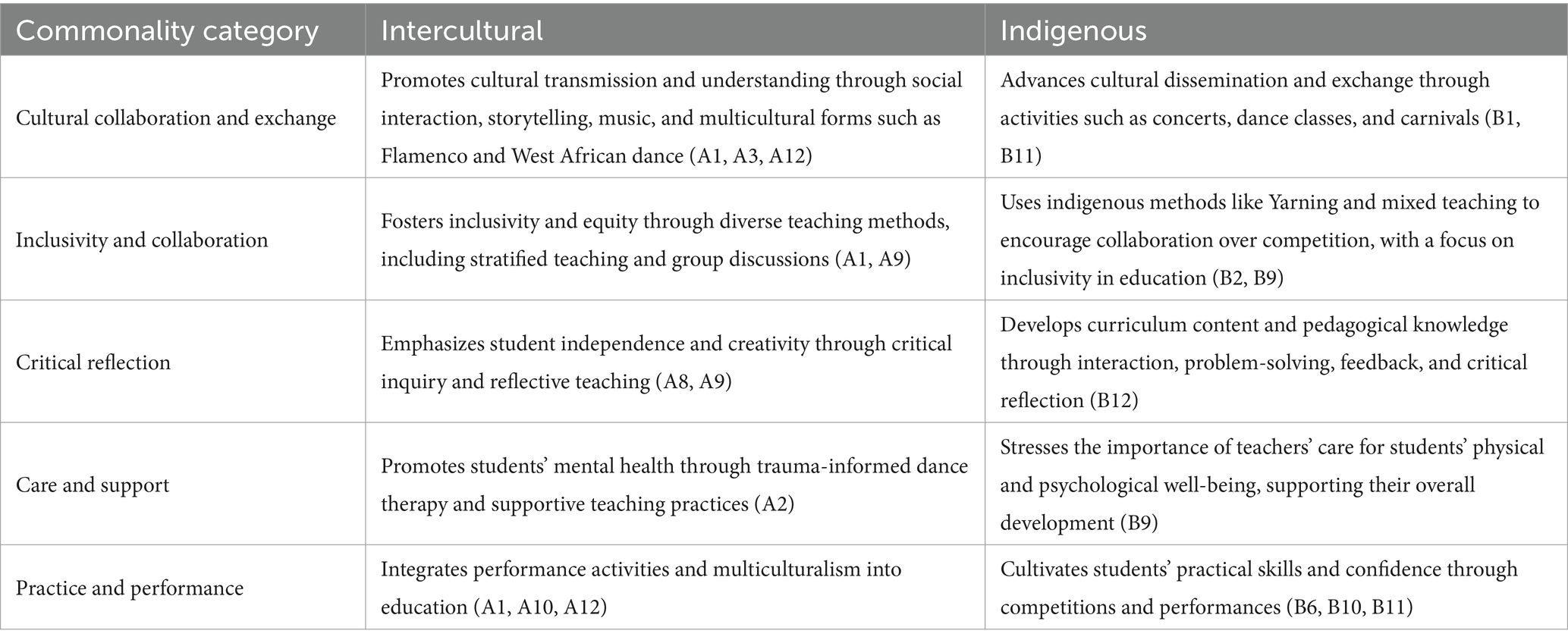
Table 17. Comparative analysis of commonalities in methodological strategies between intercultural and indigenous cultural perspectives.

Table 18. Comparative analysis of differences in methodological strategies between intercultural and indigenous cultural perspectives.
Research on intercultural and indigenous cultural dance education reveals significant commonalities in methodological strategies. Both approaches promote cultural understanding through various forms of cultural exchange, emphasize inclusivity and collaboration, value critical reflection and students’ mental health, and focus on practice and performance activities. These strategies collectively enhance the inclusivity and effectiveness of cultural dance education.
The comparative analysis of differences reveals significant contrasts in the practical implementation and theoretical application of teaching strategies between intercultural and indigenous cultural dance education. Intercultural dance education focuses more on cultural integration, diversity, and diverse teaching styles, while indigenous cultural dance education emphasizes the preservation and display of local culture, inclusivity, and collaboration. These differences reflect the distinct cultural backgrounds and educational objectives of each approach.
4.5 Analysis of research conclusions (RQ5)
4.5.1 Open coding
In summarizing the research on intercultural and indigenous cultural dance education, open coding was utilized to delve deeply into various research conclusions. Tables 19, 20 present the research findings on how dance education within cross-cultural and localized contexts promotes cultural adaptation, teaching reform, and teacher development.
The key findings of cross-cultural dance education research emphasize cultural adaptation and identity in the context of globalization, diverse teaching strategies, teacher roles and competencies, cultural inclusion and equity, as well as the emphasis on student agency in learning. By integrating tradition and innovation, these studies not only transmit technical skills but also develop rich cultural meanings, promoting cross-cultural understanding and exchange. These conclusions provide valuable insights and guidance for the development of intercultural dance education.
The research conclusions on indigenous cultural dance education primarily emphasize cultural transmission, teacher roles, cultural diversity, and community involvement. These studies highlight the multifaceted functions of dance as a tool for cultural education, serving not only as a vehicle for cultural preservation but also as a means of promoting psychological well-being and social connectivity. The research also identifies challenges within dance education and proposes corresponding improvements to enhance the overall effectiveness of dance education. Overall, these studies provide rich perspectives and practical guidance for indigenous cultural dance education, underscoring the unique value of dance within the educational system.
4.5.2 Axial coding
In further axial coding, we conducted a comparative analysis of the commonalities and differences in existing research findings. Tables 21, 22 clearly illustrate the different methodological approaches, social purposes, and interconnections between cross-cultural and indigenous cultural dance education in practice.
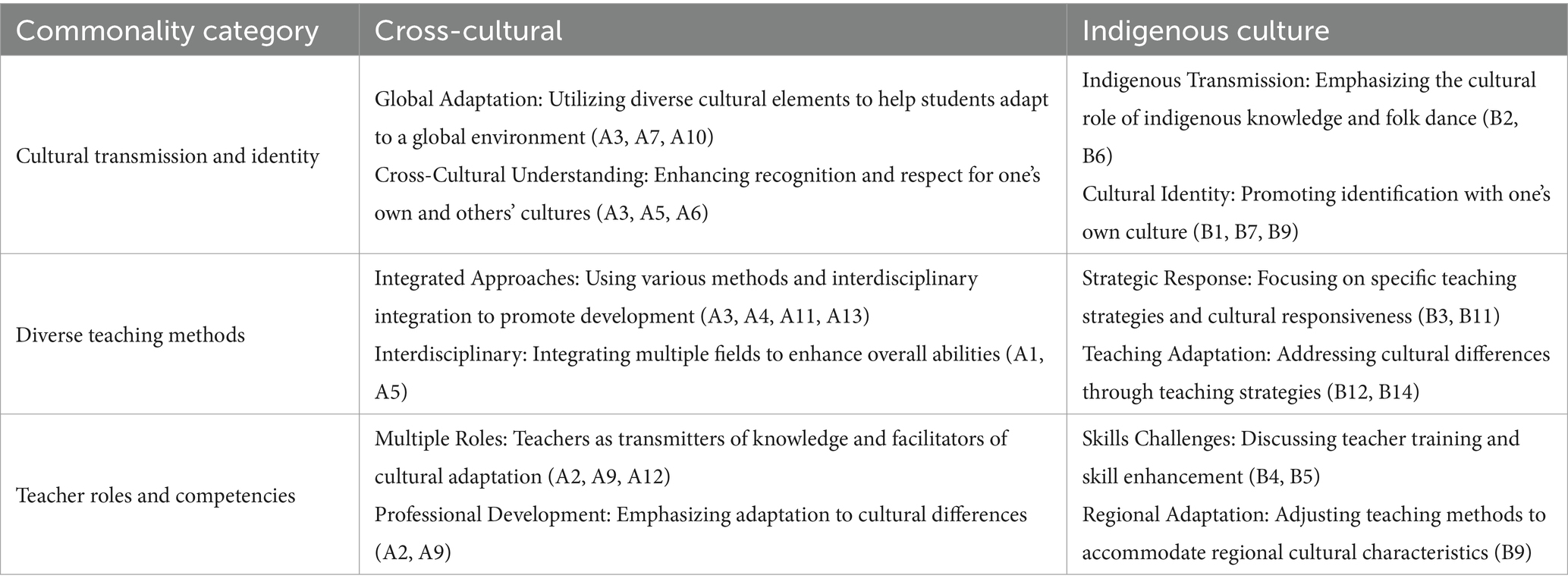
Table 21. Comparative analysis of commonalities in cross-cultural vs. indigenous cultural research conclusions.

Table 22. Comparative analysis of differences in cross-cultural vs. indigenous cultural research conclusions.
Both cross-cultural and indigenous cultural dance education center around the core objectives of cultural transmission and identity. They play a crucial role in the preservation of national cultures and the enhancement of cultural identity. Diverse teaching methods are emphasized in both contexts: cross-cultural research highlights integrated approaches, while indigenous cultural research focuses on specific strategies. Teacher roles and competencies are also crucial, with teachers needing to fulfill multiple functions in facilitating cultural adaptation and professional development. These commonalities indicate that the effectiveness of dance education relies on diverse teaching methods, multifaceted teacher roles, and sensitivity to cultural differences.
In summary, a comprehensive review of existing research conclusions in cross-cultural and indigenous cultural dance education reveals fundamental differences in cultural content selection. In terms of social and political purposes, dance education exhibits distinct social functions across different cultural and geographical contexts. In practical innovations, cross-cultural and indigenous cultural dance education each reflect unique characteristics in educational practices and innovative methods, providing clear perspectives for future researchers to understand teaching designs and objectives within different educational contexts.
5 Conclusion
Research into cross-cultural and indigenous cultural dance education is growing globally, with a notable increase in cross-cultural studies in recent years, reflecting a heightened emphasis on multiculturalism and cross-cultural exchange. Cross-cultural research encompasses a wide range of socio-economic contexts, with particular emphasis on immigrant and low-income groups, demonstrating a high degree of cultural inclusivity. This aligns with the discussions by several scholars (Outevsky, 2024; Amie, 2022) on the role of cultural education in promoting social equity and inclusive development. In contrast, indigenous cultural research focuses more on specific regions and educational groups, emphasizing cultural preservation and innovative development (Wiggins, 2015; Liu, 2020). Although there are similarities in the theoretical frameworks used to explain the impact of culture and social structures, notable differences exist in terms of cultural interaction, religious beliefs, and cultural identity. These differences provide a solid theoretical foundation for exploring cultural diversity in global dance education (Q1).
In terms of core issues, cross-cultural dance education focuses on cultural exchange within the context of globalization, emphasizing cultural identity and educational reform and innovation. Studies show that cross-cultural education fosters the understanding and acceptance of diverse cultures (Rahman, 2015; Ko, 2020). In contrast, indigenous cultural dance education focuses on the preservation and development of local culture, with a particular emphasis on fostering students’ cultural identity and sense of belonging, while also addressing the professional development of educators and dancers (Sato et al., 2021; Day et al., 2024). Additionally, it highlights the preservation of local culture and its integration with practical teaching methods, aligning with previous studies (Johnson et al., 2022) that underscore the significance of cultural identity in the context of globalization. Verall, cross-cultural research prioritizes exploring cultural interaction and educational innovation from a global perspective, whereas indigenous research places greater emphasis on local cultural preservation and the continuation of traditions (Q2).
In terms of research perspectives, scholars of cross-cultural dance education not only focus on the expression of dance as an art form but also emphasize its role in cultural adaptation, dissemination, and innovative integration within a global context. Dance is considered a significant cultural practice tool, serving multiple functions such as cultural transmission, social education, and identity construction. In contrast, researchers in indigenous cultural dance education place greater importance on the preservation and application of cultural heritage, recognizing the vital role of dance in promoting personal health, enhancing cultural understanding, national identity, and cultural reproduction (Q3).
In terms of teaching strategies, cross-cultural dance education emphasizes cultural integration and diversity, promoting students’ comprehensive development through various methods such as social interaction, cultural transmission, and critical inquiry. Indigenous cultural dance education, on the other hand, focuses on cultural collaboration and practice, fostering students’ cultural identity and critical thinking through inclusion, cooperation, and performance. Both approaches value cultural understanding and students’ mental health, but cross-cultural education concentrates on integration and innovation within a globalized context, while indigenous education highlights the preservation and transmission of local culture, reflecting their respective educational goals and cultural backgrounds (Q4).
In the research conclusions, both approaches emphasize the significance of dance in cultural transmission, the diversity of teaching methods, and the role of educators. However, cross-cultural dance education focuses on cross-cultural integration, while indigenous cultural dance education concentrates on the preservation and display of local culture, revealing differences in educational objectives and practical innovations (Q5). This finding aligns with the discussions in existing research (Banks, 2007; Hwang, 2013; Finkelstein, 2022), further emphasizing the central role of cultural diversity in education.
Based on the above research findings, this study proposes a “Cross-Cultural-Indigenous Cultural Symbiosis Model.” This model integrates the core commonalities and differences of cross-cultural and indigenous cultural dance education within a single analytical framework to reveal the dynamic interactions and symbiotic relationships between the two cultural systems in the context of globalization. The model consists of three core dimensions: Cultural Coexistence, which emphasizes the complementarity of cross-cultural and indigenous cultural education systems in educational objectives and cultural transmission, thereby enhancing mutual cultural understanding and social inclusivity (Kymlicka, 1995); Cultural Fusion, focusing on the integration strategies of cross-cultural dance education within multicultural teaching methods and a global perspective to promote mutual understanding among diverse cultures (Banks, 2006; Dervin, 2016); and Cultural Uniqueness, which highlights the protection and innovation of the unique values of indigenous cultural dance education in cultural identity, beliefs, and educational practices, fostering self-identity and innovative development of indigenous culture in the context of globalization (Homi, 1994; Hall, 1990). We believe that the “Cross-Cultural-Indigenous Cultural Symbiosis Model” not only helps to explain the core dynamic relationships within the research on cross-cultural and indigenous cultural dance education but also provides theoretical guidance for future studies. This is particularly relevant in addressing the challenge of effectively balancing cultural fusion with the preservation of indigenous culture in the context of rapid globalization and digitalization.
6 Future prospects
6.1 Cross-cultural dance education
6.1.1 Digital transformation and virtual dance education
Virtual reality technology offers the advantage of providing immersive experiences, breaking down geographical and cultural boundaries, and showcasing unique value in cross-cultural dance education. Future research could further explore the development of virtual dance classrooms and analyze their effectiveness in promoting cultural understanding and identity. For example, designing virtual dance classrooms to offer cross-cultural dance courses and conducting effectiveness assessments. Additionally, the application of digital tools such as online collaboration platforms and artificial intelligence deserves in-depth study, particularly regarding their potential and actual impact in enhancing cross-cultural communication, supporting personalized learning, and advancing global educational cooperation.
6.1.2 Local innovation in the context of globalization
With the acceleration of globalization, maintaining the uniqueness of local dance in dance education has become increasingly important. Future research could focus on the impact of globalization on local art creation, exploring the representation of indigenous dance in cross-cultural dance festivals and art exhibitions, and its contribution to global cultural exchange. Additionally, it is equally important to analyze the role of cross-cultural dance festivals and exhibitions in promoting global cultural exchange and artistic innovation. For example, observing the representation of indigenous dance at international dance festivals while also assessing how local innovations gain recognition within the global cultural landscape can provide valuable insights.
6.1.3 Psychological and sociological innovations in cultural dance education
The application of dance in psychotherapy is gaining increasing attention due to its ability to help people from diverse cultural backgrounds address psychological issues through body language. Future research could examine the therapeutic effects and practical applications of dance in different cultural environments. Additionally, it is worth further exploring how social networks and online communities influence cultural dance education, particularly how these platforms foster interaction and cultural understanding among learners in local cultural contexts. These studies will help uncover new opportunities in dance education and cultural exchange.
6.1.4 Application of artificial intelligence in cross-cultural education
Artificial intelligence technology offers broad possibilities for innovation in cross-cultural dance education. Future research could focus on how to utilize AI to design personalized learning pathways, assist in teaching, provide timely feedback, and enhance students’ learning outcomes and experiences. Furthermore, studying the application of AI-generated dance works in teaching and their potential impact on students’ creativity and cultural understanding could open new development directions for cultural dance education.
6.1.5 Future cultural identities and dance
With the rapid development of information technology, the connotations and expressions of cultural identity are undergoing profound changes. Future research could delve deeper into how dance education adapts to these changes, especially how dance teaching can make the transmission and expression of cultural identity more diverse in a digital environment. Additionally, exploring the role of dance education in cross-cultural communication, and how it helps students better understand and express diverse cultural identities, can contribute to the shaping of emerging cultural identities in a global context.
6.2 Local cultural dance education
6.2.1 Cross-cultural adaptation of local dance
In the context of globalization, effectively protecting and promoting indigenous dance is a topic of significant research value. Future studies should focus on the performance and adaptation of indigenous dance on the international stage, analyzing its unique role in fostering international cultural exchange and cooperation. Additionally, research should further examine how these strategies enhance the recognition of indigenous cultures, providing a better understanding of the role and significance of local cultures in the globalization process. For example, designing an international dance festival that invites artists from various countries to perform indigenous dances together can enhance cultural identity and strengthen mutual understanding.
6.2.2 Cultural mixing and innovation in education
Future research should investigate how to effectively integrate global cultural elements into indigenous dance education to develop innovative hybrid cultural curricula. This involves analyzing specific methods for incorporating global cultural elements into traditional dance teaching and evaluating their impact on students’ cultural awareness and learning experiences. Such studies will offer valuable insights for future teaching innovations. For example, creating a series of cross-cultural dance workshops that allow students to experience various dance styles from different cultural backgrounds while learning traditional dances.
6.2.3 Modern transformation of traditional dance
The modernization of traditional dance is an unavoidable topic in the era of globalization. Future research should explore how to blend traditional dance with modern dance forms to promote the preservation and development of traditional dance. Specifically, research could investigate the integration of traditional dance with digital arts, such as digital performances and virtual stages, analyzing the impact of these new technologies on the development of traditional dance and seeking new avenues for its modernization. For example, an augmented reality application could be developed that allows audiences to view digital performances of traditional dances on their mobile devices, thereby attracting the interest of the younger generation in traditional dance.
6.2.4 Community-driven dance education innovations
Communities play a crucial role in the implementation of cultural dance education and therefore warrant greater attention. Future research should actively explore how communities participate in and influence cultural dance education, evaluating community-led dance projects and educational models. Additionally, it should address the key role of local artists in cultural preservation and the development of local art, analyzing their impact on community dance education and their contributions to cultural preservation. For example, organizing community dance performances to encourage local artists and residents to participate together can strengthen the sense of identity among community members regarding their indigenous culture.
6.2.5 Deepening equity and diversity in education
In the context of globalization, educational equity remains an unavoidable contemporary issue. Future research should delve into the implementation pathways for diversity and equity strategies in indigenous dance education, focusing on how to effectively address these issues to ensure fair and inclusive educational practices. Evaluating the impact of these strategies on student learning outcomes and exploring how to achieve educational equity in multicultural environments are essential. By systematically analyzing practices related to diversity and equity, this research will provide a basis for the scientific formulation of educational policies and promote the development of fairness and diversity in the educational field. For example, conducting dance course assessments tailored to students from diverse backgrounds can ensure the diversity of course content and teaching methods, promoting equal participation for all students.
Author contributions
WL: Writing – original draft, Writing – review & editing, Conceptualization, Funding acquisition, Methodology. HX: Formal analysis, Software, Supervision, Writing – review & editing. ZW: Project administration, Supervision, Validation, Visualization, Writing – review & editing.
Funding
The author(s) declare that financial support was received for the research, authorship, and/or publication of this article. This research was supported by the 2022 Hunan Provincial Social Science Fund, Education Special Fund (Project No. JJ226830).
Acknowledgments
The authors would like to express their sincere gratitude to the reviewers and editor for their valuable suggestions, to Hunan Women’s University for providing places for learning and experiments.
Conflict of interest
The authors declare that the research was conducted in the absence of any commercial or financial relationships that could be construed as a potential conflict of interest.
Publisher’s note
All claims expressed in this article are solely those of the authors and do not necessarily represent those of their affiliated organizations, or those of the publisher, the editors and the reviewers. Any product that may be evaluated in this article, or claim that may be made by its manufacturer, is not guaranteed or endorsed by the publisher.
Supplementary material
The Supplementary material for this article can be found online at: https://www.frontiersin.org/articles/10.3389/fpsyg.2024.1493457/full#supplementary-material
References
Amie, K. A. (2022). Unveiling the marked narratives of the student: teaching within perceptions of racialized bodies in the dance classroom. J. Dance Educ, 22, 153–160. doi: 10.1080/15290824.2022.2092621
Banks, J. A. (2006). Cultural diversity and education: Foundations, curriculum, and teaching. New York, NY: Pearson Education.
Banks, O. C. (2007). Decolonizing the body: An international perspective of dance pedagogy from Uganda to the United States. Tucson, AZ: The University of Arizona.
Bannerman, H. (2014). Is dance a language? Movement, meaning and communication. Dance Res. 32, 65–80. doi: 10.3366/drs.2014.0087
Bhugra, D. (2005). Cultural identities and cultural congruency: a new model for evaluating mental distress in immigrants. Acta Psychiatr. Scand. 111, 84–93. doi: 10.1111/j.1600-0447.2004.00454.x
Chen, X. J., Hu, Z. B., and Wang, C. L. (2024). Empowering education development through AIGC: a systematic literature review. Educ. Inf. Technol. 29, 17485–17537. doi: 10.1007/s10639-024-12549-7
Darivemula, S., Bhatia, R., and Bhumi, S. (2021). Dancing doctors: exploring the potential of cultural dance education to improve cultural competency and clinical communication. Public Health 195, 22–23. doi: 10.1016/j.puhe.2021.03.019
Day, K., Barlo, S., McPherson, L., and Menzel, K. (2024). Aboriginal dance as pedagogy: privileging voices of Bundjalung elders. Crit. Stud. Educ, 1–18. doi: 10.1080/17508487.2023.2298203
Dervin, F. (2016). Interculturality in education: A theoretical and methodological toolbox. London, UK: Springer. doi: 10.1057/978-1-137-54544-2
Desmond, J. C. (1993). Embodying difference: issues in dance and cultural studies. Cult. Crit. 26, 33–63. doi: 10.2307/1354455
Dils, A., and Albright, A. C. (2001). Moving history/dancing cultures: A dance history reader. Middletown, CT, United States: Wesleyan University Press.
Finkelstein, J. (2022). Three Rs for dance education now: reexamine! Reevaluate! Reimagine! J. Dance Educ. 22, 170–174. doi: 10.1080/15290824.2022.2088760
Gabunia, M., Zirakashvili, M., Mebonia, N., Mikiahvili, T., Lomidze, G., Leventhal, B. L., et al. (2023). Adaptation of the strength and difficulties questionnaire for use in the republic of Georgia. Alpha Psychiatry 24, 128–135. doi: 10.5152/alphapsychiatry.2023.221003
Gartzonika, E. (2013). The integration of traditional Greek dance in public schools. Res. Dance Educ. 14, 57–70. doi: 10.1080/14647893.2012.712099
Gaur, A., and Kumar, M. (2018). A systematic approach to conducting review studies: An assessment of content analysis in 25 years of IB research. J. World Bus, 53, 280–289.
Grau, A. (2012). Dancing bodies, spaces/places and the senses: a cross-cultural investigation. J. Dance Somatic Pract. 3, 5–24. doi: 10.1386/jdsp.3.1-2.5_1
Hall, E. T. (1990). Unstated features of the cultural context of learning. In The Educational Forum. Taylor & Francis Group. 54, 21–34. doi: 10.1080/00131728909335514
Hanna, J. L. (1987). To dance is human: A theory of nonverbal communication. United States: University of Chicago Press.
Hwang, H. W. (2013). Transnational circulations of" Laban" methods: Gender, power relations, and negotiated meanings in early twenty-first century South Korea's modernity. Riverside: University of California, Riverside.
Iacono, V. L., and Brown, D. H. (2016). Beyond binarism: exploring a model of living cultural heritage for dance. Dance Res. 34, 84–105. doi: 10.3366/drs.2016.0147
Iyengar, K. M. (2014). Bharatanatyam and transnational literacy through socio-cultural pedagogy. J. Human. Soc. Sci. 19, 50–59.
Jensen, A., and Bonde, L. O. (2018). The use of arts interventions for mental health and wellbeing in health settings. Perspect. Public Health 138, 209–214. doi: 10.1177/1757913918772602
Jin, F., Song, Z., Cheung, W. M., Lin, C. H., and Liu, T. (2024). Technological affordances in teachers' online professional learning communities: a systematic review. J. Comput. Assist. Learn. 40, 1019–1039. doi: 10.1111/jcal.12935
Johnson, S. J., de la Piedra, M. T., Sanmiguel‐López, A., and Pérez‐Piza, M. (2022). Mexican‐heritage Children’s Learning of Ballet Folklórico: Herencia, Familia, y Orgullo. ANTHROPOL EDUC QUART, 53, 130–148. doi: 10.1111/aeq.12410
Kealiinohomoku, J. W. (1970). An anthropologist looks at ballet as a form of ethnic dance. Impulse 20, 24–33.
Ko, K. S. (2020). East Asian dance/movement therapy educators’ experiences of teaching dance/movement therapy in East Asia after training in the US. Arts Psychother, 71, 101711.
Kurath, G. P., Brandel, R., Chilkovsky, N., List, G., Laubin, R., Laubin, G., et al. (1963). Dance ethnology, dance education, and the public. Ethnomusicology 7, 234–247. doi: 10.2307/924586
Kushairi, N., and Ahmi, A. (2021). Flipped classroom in the second decade of the Millenia: a Bibliometrics analysis with Lotka’s law. Educ. Inf. Technol. 26, 4401–4431. doi: 10.1007/s10639-021-10457-8
Lewis, J., and Ziady, J. (2021). Towards vocational training of the south African dancer: anxiety or agency? Africa Educ. Rev. 18, 69–86. doi: 10.1080/18146627.2022.2111996
Lin, Y., and Yu, Z. (2024). An integrated bibliometric analysis and systematic review modelling students' technostress in higher education. Behav. Inform. Technol. 1-25, 1–25. doi: 10.1080/0144929X.2024.2332458
Liu, S. (2020). The Chinese dance: a mirror of cultural representations. Res. Dance Educ, 21, 153–168. doi: 10.1080/14647893.2020.1782371
Liu, Z., and Kalimyllin, D. (2024). Chinese dance education and culture path in the preservation and transmission of cultural heritage to the younger generation. Res. Dance Educ., 1–14. doi: 10.1080/14647893.2024.2331120
Mabingo, A. (2015). Decolonizing dance pedagogy: application of pedagogies of Ugandan traditional dances in formal dance education. J. Dance Educ. 15, 131–141. doi: 10.1080/15290824.2015.1023953
Mabingo, A., Avelar, K., Chen, R., and Cabrera, F. M. (2024). Solidarities of the marginalized as anti-racist dance pedagogy: reflections on collaborative advocacy from dance educators with connective marginalities. J. Dance Educ. 24, 136–147. doi: 10.1080/15290824.2022.2053688
Masunah, J. (2008). A case study of the multicultural practices of two United States dance educators: Implications for Indonesian K-9 dance education. Doctoral dissertation, The Ohio State University
Mejia, D. (2023). The collective workshop of our emerging global citizenship in transcultural fusion dance (TcFD). Int. J. Arts Human. Soc. Sci. 4, 31–51. doi: 10.56734/ijahss.v4n7a5
Mollenhauer, J. (2022). Cultural dance in Australia: Essays on performance contexts beyond the pale. Singapore: Springer Nature. doi: 10.4324/9780820551
Nannyonga-Tamusuza, S. (2003). Competitions in school festivals: a process of reinventing Baakisimba music and dance of the Baganda (Uganda). World Music, 45, 97–118.
Olvera, A. E. (2008). Cultural dance and health: a review of the literature. Am. J. Health Educ. 39, 353–359. doi: 10.1080/19325037.2008.10599062
Outevsky, D. (2024). Soviet bodies in Canadian DanceSport: identities and culture in four competitive ballroom dance studios. RES DANC EDUC, 25, 189–209. doi: 10.1080/14647893.2022.2075335
Page, M. J., McKenzie, J. E., Bossuyt, P. M., Boutron, I., Hoffmann, T. C., Mulrow, C. D., et al. (2021). Updating guidance for reporting systematic reviews: development of the PRISMA 2020 statement. J. Clin. Epidemiol. 134, 103–112. doi: 10.1016/j.jclinepi.2021.02.003
Peng, T., Wang, C. L., Xu, J., Dai, J., and Yu, T. (2024). Evolution and current research status of educational leadership theory: a content analysis-based study. SAGE Open 14, 1–16. doi: 10.1177/21582440241285763
Phillips-Fein, J. M. (2011). How we dance: helping students unpack the impact of dance television shows. J. Dance Educ. 11, 134–136. doi: 10.1080/15290824.2011.620937
Rahman, M. (2015). Transnational pedagogy of classical dance: politics of ideology between Bangladesh and India. THEATR DANCE PERFORM, 6, 85–96. doi: 10.1080/19443927.2014.944718
Rosala, D., and Budiman, A. (2020). Local wisdom-based dance learning: teaching characters to children through movements. Mimbar Sekolah Dasar. 7, 304–326. doi: 10.17509/mimbar-sd.v7i3.28185
Rowe, N. (2008). Dance education in the occupied Palestinian territories: hegemony, counter-hegemony and anti-hegemony. Res. Dance Educ. 9, 3–20. doi: 10.1080/14647890801924188
Sanz-Camarero, R., Ortiz-Revilla, J., and Greca, I. M. (2023). The impact of integrated STEAM education on arts education: a systematic review. Educ. Sci. 13:1139. doi: 10.3390/educsci13111139
Sato, T., Suzuki, N., Eckert, K., and Ellison, D. W. (2021). Japanese secondary physical educators’ professional development experiences of teaching Japanese traditional dance. J. Dance Educ., 21, 34–43. doi: 10.1080/15290824.2019.1664744
Schupp, K. (2019). I can’t. I have dance: dance competition culture as serious leisure and pre-professional training. Leis. Stud. 39, 479–492. doi: 10.1080/02614367.2019.1643902
Shapiro, S. B. (1998). Dance, power, and difference: Critical and feminist perspectives on dance education. Champaign, IL: Human Kinetics Publishers.
Shapiro, S. B. (2008). Dance in a world of change: Reflections on globalization and cultural difference. Champaign, IL: Human Kinetics.
Siljamäki, M., Anttila, E., and Sääkslahti, A. (2010). Pedagogical conceptions of Finnish teachers of transnational dances. Cases: African dance, oriental dance and flamenco. Nordic J. Dance 2, 38–55. doi: 10.2478/njd-2011-0006
Smith, A. D., and Smith, A. (2013). Nationalism and modernism. London, New York: Routledge. doi: 10.4324/9780203167960
Stinson, S. W. (1988). Dance for young children, Finding the magic in movement. Reston, VA: National Dance Association.
Wang, F., Wu, Y., Wang, S., Du, Z., and Wu, Y. (2024). Development of an optimal short form of the GAD-7 scale with cross-cultural generalizability based on Riskslim. Gen. Hosp. Psychiatry 87, 33–40. doi: 10.1016/j.genhosppsych.2024.01.010
Wiggins, T. (2015). Music and Dance as Icons of Cultural Identity: The Development of the Nandom Sekpere Group in Ghana and its National Context. Muziki, 12, 1–22. doi: 10.1080/18125980.2015.1031456
Xiao, Y., and Watson, M. (2019). Guidance on conducting a systematic literature review. J. Plan. Educ. Res. 39, 93–112. doi: 10.1177/0739456X17723971
Yang, Y., Wang, G., Zhang, S., Wang, H., Zhou, W., Ren, F., et al. (2022). Efficacy and evaluation of therapeutic exercises on adults with Parkinson’s disease: a systematic review and network meta-analysis. BMC Geriatr. 22:813. doi: 10.1186/s12877-022-03510-9
Keywords: cultural dance education, cultural identity, systematic literature review, global perspective, cross-cultural exchange
Citation: Liu W, Xue H and Wang ZY (2024) A systematic comparison of intercultural and indigenous cultural dance education from a global perspective (2010–2024). Front. Psychol. 15:1493457. doi: 10.3389/fpsyg.2024.1493457
Edited by:
Yibo Wu, Peking University, ChinaReviewed by:
Attwell Mamvuto, University of Zimbabwe, ZimbabweAna María Botella Nicolás, University of Valencia, Spain
Copyright © 2024 Liu, Xue and Wang. This is an open-access article distributed under the terms of the Creative Commons Attribution License (CC BY). The use, distribution or reproduction in other forums is permitted, provided the original author(s) and the copyright owner(s) are credited and that the original publication in this journal is cited, in accordance with accepted academic practice. No use, distribution or reproduction is permitted which does not comply with these terms.
*Correspondence: Zi Yi Wang, d2FuZ3ppeWlkYW5jZUAxNjMuY29t
 Weishan Liu
Weishan Liu Hanbing Xue
Hanbing Xue Zi Yi Wang
Zi Yi Wang